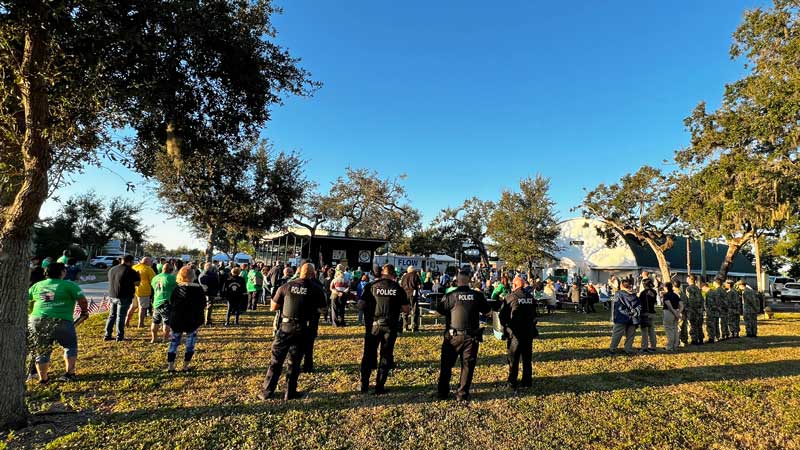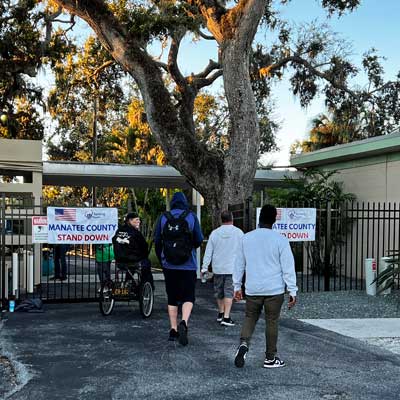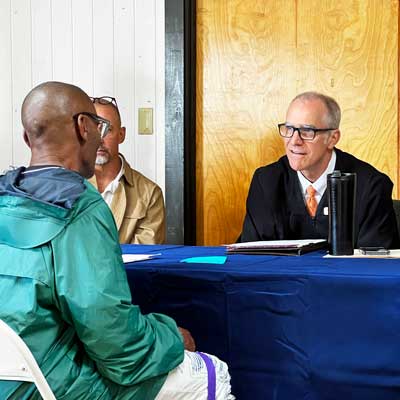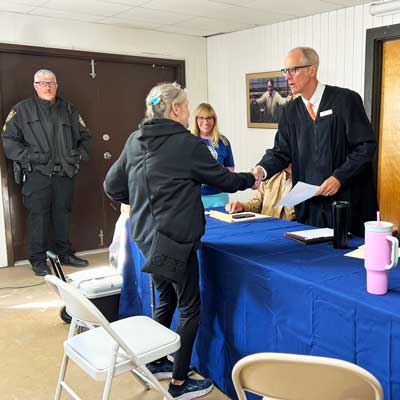 Veterans, volunteers and members of the community gather for the opening remarks of the 2025 Manatee County Stand Down event held November 1st at the Manatee County Fairgrounds in Palmetto.
Veterans, volunteers and members of the community gather for the opening remarks of the 2025 Manatee County Stand Down event held November 1st at the Manatee County Fairgrounds in Palmetto.
Amnesty Court paves way for Veterans to regain driving privileges
Watching the opening ceremony from the side of the stage Circuit Judge Stephen Walker seemed eager to start the morning’s court proceedings.
 People approach the entrance of the 27th annual Manatee County Stand Down event.
People approach the entrance of the 27th annual Manatee County Stand Down event.
He was “suited up” in his robe and seated at a folding table draped in a blue tablecloth long before eligible veterans had finished their paperwork. Armed with a travel mug of coffee and a legal pad and flanked by Assistant Public Defender Chance Craig on his right and Assistant State Attorney Cynthia Evers on his left, Judge Walker was ready to kick off the 2025 session of Amnesty Court, as part of Turning Points’ Manatee County Stand Down event.
The 27th annual event, one of many around the state, is organized to help and connect homeless or at-risk veterans with social services, health care, job opportunities, and comforts that some take for granted, like a hot meal, a haircut or a shower.
One of the services offered at Stand Down is Amnesty Court, a cooperative effort between the Veterans Administration, Twelfth Judicial Circuit Veterans Court staff, Manatee County Sheriff’s Office, Manatee County Clerk and Comptroller’s Office, State Attorney’s Office, Office of the Public Defender and other criminal justice stakeholders.
 Circuit Judge Stephen Walker talks to a veteran during a session of Amnesty Court, a part of the Manatee County Stand Down event.
Circuit Judge Stephen Walker talks to a veteran during a session of Amnesty Court, a part of the Manatee County Stand Down event.
This limited-focus problem-solving court allows veterans opportunities to address unpaid court fees and fines (legal financial obligations or LFOs) and unpaid traffic violations that create a barrier to regaining driving privileges. The court evaluates each veteran based on the individual’s situation and after taking that into consideration, the judge has the discretion to reduce, waive or convert LFOs to public service work hours.
If the veteran’s situation falls outside the limited scope of the Amnesty Court, the individual can receive guidance from the public defender and prosecutor’s office regarding steps he or she could take to potentially resolve the matter.
It was Judge Walker’s first time presiding over Amnesty Court. The experience also served as an opportunity for him to learn the ropes of the division. In January 2026 Judge Walker assumes the role of administrative judge of Criminal Division “P” and he’ll be responsible for overseeing the administration of all problem-solving courts in the circuit. That same month he’ll take the helm as presiding judge of Drug Court in both Manatee and Sarasota counties.
In the “courtroom,” a room in the arts and crafts building at the Manatee County Fairgrounds in Palmetto, the court clerk handed documents to Judge Walker for review. In a booming voice to be heard over the din of people quietly chatting, the judge called the name of the first veteran. Introducing himself as he shook the veteran’s hand, Judge Walker asked the man about his military service and the circumstances that brought him before the Court that morning.
 After each hearing, Judge Walker shook the hand of each veteran that appeared before him during Amnesty Court.
After each hearing, Judge Walker shook the hand of each veteran that appeared before him during Amnesty Court.
The judge’s voice softened as he relaxed into the informality of the proceedings in the unorthodox surroundings. And he listened intently to the story of each veteran. In one instance, after much discussion between the judge and clerk, and after receiving input from both attorneys, Judge Walker was able to resolve the financial burden that kept the veteran from obtaining his driver’s license.
Another defendant had nearly $1,000 in court fines and fees that kept him from finishing his probation. The veteran had put in a lot of work while under judicial supervision, completing the sanctions in his criminal cases, and had been sober for 18 months. He said he had a good relationship with his probation officer, who in fact was the one to suggest the veteran take advantage of Amnesty Court. The Court was able to set aside the driver’s license suspension, dismissed late fees associated with the cases and waived the remaining costs, fines and fees that were assessed.
“The deputy clerks, State Attorney, and Public Defender worked very hard to put me in a position where we, collectively, could do something important for those who deeply deserve it,” Judge Walker said. “It was very rewarding for me, but the credit belongs with all the volunteers who dedicate their time and effort to help our veterans.”
Twelfth Circuit Chief Judge Diana Moreland explains why it is important for the court and judges to be involved in community events. “As judges we regularly witness the act of citizen jurors in service of our Constitution; however, events like Manatee County Stand Down give us the opportunity to leave our raised benches to service those who have put themselves in harm’s way to guarantee that we have a Constitution.”
In total, Amnesty Court assisted 31 veterans, waiving $32,079.32 in fees in 51 cases. Four cases were referred to a payment plan, said Michelle Hernandez, supervisor of the Traffic, Criminal Fines, and Department of Financial Recovery unit of the Manatee County Clerk of Circuit Court & Comptroller’s office.
In addition, Hernandez said the Amnesty Court team addressed 13 out-of-county cases: 12 for Sarasota County and one for Charlotte County, waiving an additional $5,030.50 in fines and fees.
Return to News List